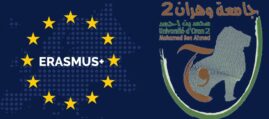KEY ACTION 3 – SUPPORT TO POLICY DEVELOPMENT AND COOPERATION
This Key Action supports:
The European Youth Together action, (targeting both youth organisations at grass root level and larger organisations), supporting partnerships across borders. Activities under this action should contribute to widening the outreach towards young people to ensure a diversity of voices, and reach a diverse range of young people within and beyond youth organisations, including youth with fewer opportunities. They should involve a variety of traditional and digital channels and facilitate the development of partnerships and networks, enabling participation and access for grassroots NGOs and youth movements. This Action is not open for Algeria.
In addition, this Key Action covers:
- Actions aimed at preparing and supporting the implementation of the EU policy agenda on education, training, youth and sport, including sectoral agendas for higher education, vocational education and training, schools and adult learning, and in particular by facilitating the governance and functioning of the Open Methods of Coordination.
- Carrying out European policy experimentations, led by high-level public authorities and involving field trials on policy measures in several countries, based on sound evaluation methods. In line with the EU Youth Strategy, a financial support will also be provided to the structures animating the National Working Groups designated by each national authority in the frame of the EU Youth Dialogue at national level.
- Actions aimed at gathering evidence and knowledge about education, training, youth and sport systems and policies at national and European level, with a view to facilitate reasoned policy-making. Evidence gathering and analysis will be undertaken through EU-wide or international surveys and studies as well as thematic and country-specific expertise.
- Actions which facilitate transparency and recognition of skills and qualifications, as well as the transfer of credits, to foster quality assurance, support validation of non-formal and informal learning, skills management and guidance. This area will also include the support to national and European-level bodies or networks that facilitate cross-European exchanges as well as the development of flexible learning pathways between different fields of education, training and youth and across formal, non-formal and informal learning settings. Actions that foster policy dialogue with stakeholders within and outside the European Union, though, for example, conferences, events and other activities involving policy makers, practitioners and other stakeholders in the fields of education, training, youth and sport, to raise awareness about the relevant European policy agendas and to promote Europe as an excellent study and research destination.
- Cooperation with international organisations with highly recognised expertise and analytical capacity (such as the OECD and the Council of Europe), to strengthen the impact and added value of policies in the fields of education, training, youth and sport.
